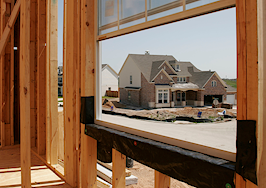This report is available exclusively to subscribers of Inman Intel, a data and research arm of Inman offering deep insights and market intelligence on the business of residential real estate and proptech. Subscribe today.
In a housing market this murky, real estate professionals often find themselves having to guess at the mindset of their potential clients — especially those clients who have yet to enter the market, or who have temporarily removed themselves from it.
That’s where Maegan Sherlock comes in.
The senior research analyst for John Burns Research and Consulting leads a team that keeps tabs on consumer sentiment, with a particular focus on people who might be in a position to eventually buy homes.
In a video interview Tuesday, Sherlock told Intel that most consumers she’s surveyed have been holding out hope for mortgage rates to fall below a “magic number” of 5.5 percent. With current rates near 7 percent, that’s something most economists believe we’re unlikely to see any time soon.
Homebuilders have been taking advantage of this buyer preference, moving their inventory at times with multi-point rate buydowns and other incentives. But in the resale market, the type of consumer mindset shift that could unlock existing-home inventory and boost transactions across the board may be far away, Sherlock said.
Her thoughts below have been edited for length and clarity.
Intel: The housing market is in this really strange place. Homeowners are looking at today’s 7 percent mortgage rates, and the much lower rates on their existing loans, and concluding it’s tough to justify a move right now. You surveyed a group of potential homebuyers earlier this year. Did you learn anything about what might eventually convince these buyers to move?
Sherlock: Ultimately we feel that people are feeling locked in by their current, existing low rates. If you have a sub-4 percent rate, why would you want to trade that, like you said, for 6 percent, 7 percent or higher?
So we really do see this lock-in effect. And ultimately, what it’s going to take for people to move is a “good deal” — whatever they determine is a good deal — and lower mortgage rates.
We do have some stats on what is inspiring people to move ultimately. We think it’s going to take a return to these historically low rates. Which, initially that’s what people were telling us, but we don’t see that happening any time soon.
I think with time, acceptance of these higher interest rates will change people’s mindset a little bit, but one of the interesting things we saw in the report was just because people had lived through a period of time — like in the ’80s, say — with higher rates, doesn’t mean they’re necessarily willing to go back to living with rates that high.
That’s interesting. Was that based on responses by age group, mostly?
Yep. So when we do our surveys, we segment by life stage. And we have four main life-stage groups.
We have what we call young singles and couples [and] mature singles and couples [with no children in the household]. And then the two middle groups are young families or mature families, and that’s based on the age of the children in the household, not necessarily the age of the adult in the household. So a young family is anybody with children under age 12, and a mature family is anybody with children age 12 and older.
Can you give our readers an idea of how you arrived at that 5.5 percent mark? What share of the respondents said they were comfortable with that rate or below? I imagine you asked them about different thresholds of mortgage rates.
First we asked if they were saving to purchase a home or planning to purchase with a mortgage. It was 71 percent of prospective homebuyers said they would be willing to purchase a home at 5.5 percent or under, and then after that it drops. So 29 percent reported willingness to accept a higher rate above that 5.5 percent.
I think as you alluded to earlier, very few people in the world of housing economics, or economics in general, are predicting a return to mortgage rates below that level any time soon. And it sounds like that would potentially set up the market for a more protracted period of adjustment. You mentioned that people’s mindsets might have to change, and their acceptance of these higher rates might have to change as well.
I think it’s that, and then like you said, there are always people who need to move for one reason or another.
Oftentimes, for young consumers, it depends on getting their finances in line, whether it’s saving for that down payment [or] waiting till they earn a higher income. People who have life-stage changes — they have a child, or maybe they can’t live in a one-bedroom apartment anymore — they’re going to have to buy. Or people who are looking to downsize.
Obviously, there’s always going to be financial implications to moving and looking for a home. But there’s also reasons that people have to consider: Their quality of life, and what their other needs are outside of that.
Just, perhaps, with fewer people in the market who are making a more elective decision to move.
Exactly.
I thought it was interesting that the report you coauthored suggests homebuilders have had success moving homes when they’re able to buy the rate down below that 5.5 percent mark. It seems to sort of be a real-world confirmation of what you guys learned from the survey.
Yep. So I just want to clarify, my team does not work on the builder survey, but we did incorporate some of that information because we were seeing some traction with rate buydowns.
But the stat that we included in that article was from a February builder survey. To counter the rising rates, in February we surveyed 117 builders, and 63 percent of them at the time were offering buydowns, so well over half at that point.
[Editor’s note: In that builder survey, builders reported having the most success when they bought down the buyer’s mortgage rate below 5.5 percent. Many of the largest builders were buying rates down below 5.0 percent at the time.]
Are there any other key market benchmarks or metrics that you’re watching with interest in the months to come?
The surveys that I conduct on my team are primarily of consumers. We do a few industry-professional surveys, but 80 percent of the time, we survey consumers.
So I’m constantly hearing their thoughts on whether their kitchen works for them or what their work-from-home status is. And regardless of what topic that we’re surveying on, we often include a question about how and where you’re working. How has that changed since 2020, obviously, since the onset of the pandemic?
So that’s one area that I know my team and I are particularly interested in, is how is that a driving factor these days, and how it’s changed over the last two or three years.
And then on top of that, when we look at the various life stage groups, what’s most important to them in terms of location for mature segments. Those mature singles and couples that I was talking about earlier, we often see them relocating. We call them baby-chasers, not just empty-nesters, because they like to go where their grandkids are, where their children move to.
So if those children are moving to another market where their jobs require them to be, or wherever the case may be, oftentimes, their parents and grandparents are encouraged to move to those same locations.
So I just think that’s really interesting to see those kinds of migration patterns.













